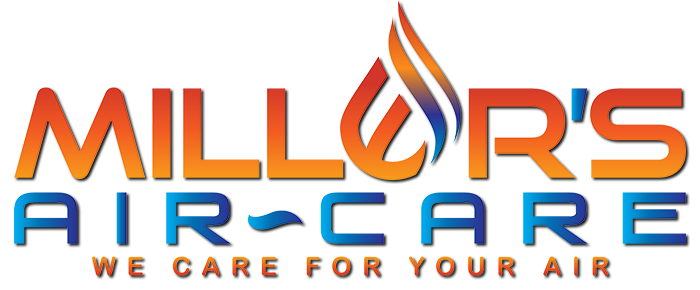Follow Us x
Q. How often should I service my HVAC system?
Miller's Air Care, LLC recommend having your system maintained at LEAST once a year. Most modern air conditioners will produce between 5 and 20 gallons of water per day. This can cause a buildup of bacteria in the condensation line that can cause it to block up and overflow if not cleaned. Also electrical components should be checked to prevent further damage of equipment.
Q. What is the warranty like on a new HVAC system?
A. Most equipment manufactures offer 10 year limited warranties on functional parts if installed by a licenced contractor.
Q. Which HVAC system is right for my home?
A. Every home is different. There are many options for every application that we will taylor to your home
Q. How do I know if I need a new heater or air conditioner?
A.When repair costs become costly and equipment is unreliable. Chances are if your air conditioning system is over 10 years old you could be saving money on your utility bill with a new/ more efficient system
Q. How often should I check my air filter?
A.Every home is different. If your system uses a 1" air filter we recommend checking it at least monthly. 5" filter systems should be checked every 3 months but can last as long as a year.
Q. How often should I clean my air filter?
A. If your equipment uses a washable filter, clean it monthly! We don't recommend washable filters as they typically don't filter as well.
Q. What is the proper indoor humidity level?
A. Indoor humidity is the biggest thing we battle in florida. Extended periods of time over 65% can cause mold and other growth in your home. We recommend a humidity level of 50-60%
Q. What Size Heating and Air Conditioning System Do I Need?
A. A load calculation or "Manual J" is a calculation that is done to determine the heat infiltration on your home to determine the necessary cooling and heating capacity of the home.
Q. What type of heating and air conditioning system should I get?
A. There are many different brands and efficiencies of equipment available. Schedule a consultation to see what might be the best fit for you and your home.
Q. What is better: Gas, Electric?
A. In Florida with our short winter season heat pumps are typically more commonly used than gas furnaces ,however, if you're someone that likes to keep it hot during winter months a gas furnace will provide more instant heat.
Q. Do you have a loyalty program?
A.Miller's Air Care offers a Maintenance agreement program that consists of 2 preventive maintenances a year. One visit to check on the cooling mode before the peak of summer and another to check heating in the winter months. We will check all electrical components and refrigerant levels along with cleaning condensation lines and equipment. You will also receive a 15% discount on parts and labor for any service repairs you might need for $180.00 a year.
Q. What if I just want my equipment maintained once a year?
A.Give us a call any time and we will get you on our schedule for a one time tune up for $125.00
Q. Is using a UV light air cleaner beneficial?
A. Ultraviolet lights were shown to kill mold, viruses and bacteria more than 100 years ago. In fact, in 1903, Niels Finsen was given the Nobel Prize in Medicine for using UV to effectively treat patients with skin infections.
Today, UV lights are used for germicidal use in hospitals, restaurants and grocery stores. And they have been shown effective in killing and sterilizing HVAC systems. Here are two examples:
1). In 2012, a study at Duke University Medical Center showed that UV lights killed 97% of bacteria that were resistant to antibiotics, the so-called superbug bacteria that are the toughest to kill.
2). The Journal of Applied and Environmental Biology reported in 2001 that germicidal UV radiation significantly reduces airborne fungi in air handling units
Today, UV lights are used for germicidal use in hospitals, restaurants and grocery stores. And they have been shown effective in killing and sterilizing HVAC systems. Here are two examples:
1). In 2012, a study at Duke University Medical Center showed that UV lights killed 97% of bacteria that were resistant to antibiotics, the so-called superbug bacteria that are the toughest to kill.
2). The Journal of Applied and Environmental Biology reported in 2001 that germicidal UV radiation significantly reduces airborne fungi in air handling units
